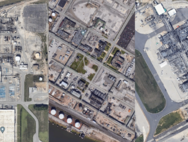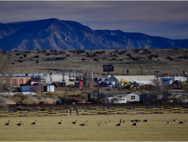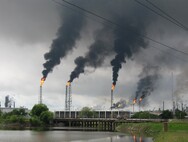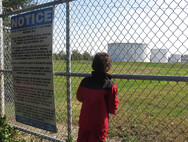

Media
Media
Share this page:
News Archive
Year
US faces almost daily hazardous chemical accidents, research suggests
November 9, 2023
Hazardous chemical accidents are occurring almost daily, on average, in the United States, exposing people to dangerous toxins through fires, explosions, leaks, spills and other releases, according to a new analysis by non-profit researchers. The report, prepared by Coming Clean, in conjunction with a network of environmental and economic justice organizations in the Coalition to Prevent Chemical Disasters, documents what it calls an “alarming frequency” of accidents, and comes a month before US regulators are expected to release final rules aimed at preventing such incidents.
Read MoreOver 270 hazardous chemical incidents have occurred in the United States this year alone, highlighting need for stronger chemical safety regulations
November 9, 2023
Over 825 hazardous chemical incidents – including fires, explosions and harmful chemical releases – have occurred since the beginning of 2021, and over 270 incidents have occurred this year alone, according to data published today by the Coalition to Prevent Chemical Disasters. Data included in the coalition’s online Chemical Incident Tracker is sourced from news reports. “Preventable chemical incidents are happening far too often across the country,” said Maya Nye, Federal Policy Director of Coming Clean, a member of the Coalition to Prevent Chemical Disasters. “Communities shouldn’t have to leave their homes, shelter in place, or worry for the safety of their air and water because chemical plants can’t contain their toxic chemicals. Hazardous facilities must be required to do more to protect workers and communities.”
Read MoreEPA Needs to Act to Close Regulatory Gaps that Fail to Prevent Chemical Disasters
October 7, 2023
Coming Clean's Federal Policy Director Maya Nye spoke to PBS News about the urgent need for EPA to finalize a strong new Risk Management Plan rule to help prevent chemical disasters (which occur on average every other day across the US). Fenceline communities, workers, national security advocates, and many others have called on EPA to require transition to safer chemicals and processes whenever possible.
Read MoreFarmworkers, dollar store shoppers call on 99 Cents Only Stores to restrict harmful chemicals in products
September 26, 2023
Allied members of the Campaign for Healthier Solutions, including farmworkers, environmental justice advocates, parents, and dollar store shoppers demonstrated outside 99 Cents Only Stores Headquarters and local stores across the state, urging the company to phase out chemicals of concern from its products. A delegation representing the campaign also delivered a letter requesting a meeting with 99 Cents Only Stores’ interim Chief Operations Officer Michael Simoncic and Director of Compliance Edgar Flores, to begin the work of drafting a corporate chemical management policy.
Read MorePiden eliminar productos tóxicos en las tiendas de 99 centavos en California
September 26, 2023
Este martes, un grupo de personas protestó al frente de una de las tiendas de 99 centavos para exigir que se eliminen productos que tienen, al parecer, sustancias tóxicas, pues dicen que pone en riesgo la salud de las personas, especialmente los de bajos ingresos, que acuden a estas tiendas. Según los manifestantes, algunos pesticidas y jabones con malos olores les habría provocado dolores de cabeza e incluso aseguran que hasta ciertas medicinas les causaron una reacción alérgica.
Read MoreEPA’s actions to lower cancer-causing emissions are leaving too many communities behind
August 14, 2023
This April, the Environmental Protection Agency (EPA) announced a proposal to significantly reduce emissions of toxic and other harmful air pollution from chemical plants, with the goal of dramatically reducing the number of people who face elevated air toxics-related cancer risks. Coming Clean and the Environmental Justice Health Alliance (EJHA) both applauded this proposed rule, and encouraged members to submit public comments supporting its finalization. However, as our networks reviewed the details of this rule, and the list of facilities that it would actually regulate, many of our members soon realized that it wouldn’t impact all the facilities emitting cancer-causing chemicals in their neighborhoods.
Read MoreCampaign Pushes Local Food & Safe Products at Dollar General
July 17, 2023
Since 2019, the Local Food Solutions project has been asking Dollar General to offer healthy, local food options in its stores, starting with four stores in Albuquerque, New Mexico. The South Valley of Albuquerque is the base of operations for the Agri-Cultura Network, a community-based and farmer-led cooperative that works to provide access to local and sustainably grown produce and spur local economic development. Agri-Cultura Network and its network of more than 70 farms and ranches use traditional and innovative agricultural practices to improve environmental and community stewardship and strengthen the agrarian and cultural heritage of their land and its residents. Local Food Solutions is offering a path forward for Dollar General to provide highly desirable, local food to its customers, and in doing so, reinvest in the communities where its stores operate.
Read MoreStatement of gratitude to Richard Moore for his twelve years as National Co-Coordinator of EJHA
June 30, 2023
With warmth and deep appreciation, we thank Richard Moore for his twelve years as National Co-Coordinator of the Environmental Justice Health Alliance for Chemical Policy Reform (EJHA). Richard will be stepping down from this role today, while continuing to serve as Co-Coordinator of Los Jardines Institute in Albuquerque, New Mexico, an affiliate member of EJHA. During his time as National Co-Coordinator, Richard helped secure historic commitments from the White House and federal agencies to advance environmental justice, the result of decades of dedicated bottom-up organizing rooted in solidarity and respect.
Read MoreDollar General urged to protect worker and customer health at annual shareholder meeting
May 31, 2023
Dollar General shareholders urged the discount retailer to better protect the health of workers and shoppers today at its annual shareholder meeting in Goodlettsville, Tennessee. Shareholder advocates with the Campaign for Healthier Solutions (CHS) called on Dollar General to phase out chemicals of concern from its products and receipts, and voted yes on a shareholder proposal requesting an independent worker safety and well-being audit. New testing conducted by the Ecology Center Health Stuff Lab has found hormone-disrupting bisphenol S (BPS) in receipts that were printed in select stores of the major discount retailers in 2022, including Dollar General.
Read MoreSowing Seeds of Justice Along the Rio Grande
April 27, 2023
Wracked by some of the highest poverty rates in Albuquerque, New Mexico, the predominantly Chicano community of Mountain View, seven miles south of downtown, may seem an unlikely setting for a national wildlife refuge. The 11-square-mile area some 6,000 people call home also contains the state’s largest sewage treatment facility, several chemical manufacturing, asphalt, and concrete plants, sprawling auto salvage lots, bulk-fuel terminals, two Superfund sites and more than 40 other industrial sites regulated by the EPA. Not surprisingly, there are high levels of air pollution and groundwater contamination here.But thanks to decades of grassroots efforts, it is now also home to the first-ever national wildlife refuge being built, literally, from the ground up and in collaboration with the community it serves.
Read MoreEJHA and Coming Clean celebrate historic executive order deepening federal commitments to Environmental Justice
April 21, 2023
Today, President Biden signed the executive order Revitalizing Our Nation’s Commitment to Environmental Justice for All, directly incorporating many recommendations of the White House Environmental Justice Advisory Council. The executive order makes clear that the pursuit of environmental justice is a duty of all executive branch agencies and should be incorporated into their missions, directs agencies to consider the cumulative health impacts of pollution on communities, and directs agencies to strengthen their direct engagement with impacted communities. The White House also published an Environmental Justice Scorecard and announced new Justice40 covered programs.
Read MoreBiden to Create White House Office of Environmental Justice
April 21, 2023
President Biden on Friday announced the creation of a White House Office of Environmental Justice, one of several actions to address the unequal burden that people of color carry from environmental hazards.“Every federal agency must take into account environmental and health impacts on communities and work to prevent those negative impacts,” Mr. Biden told a crowd of applauding activists gathered at a Rose Garden ceremony. “Environmental justice will be the mission of the entire government.” Richard Moore, a co-coordinator of the Los Jardines Institute in Albuquerque, N.M., and a co-chairman of the White House Environmental Justice Advisory Council, said the executive order was “answering a decades-long call to put environmental justice at the heart of federal policy.”
Read MoreEPA Action to Reduce Cancer-Causing Air Pollution Is Critical and Long Overdue
April 6, 2023
Today, the U.S. Environmental Protection Agency (EPA) proposed a rule to significantly reduce emissions of toxic and other harmful air pollution from chemical plants, intended to reduce air toxics-related cancer risks in fenceline communities. Coming Clean and the Environmental Justice Health Alliance for Chemical Policy Reform (EJHA) applauded the EPA for committing to take action to dramatically reduce emissions of cancer-causing chemicals from chemical and polymer plants. Under the proposed rule, these facilities will be required to conduct fenceline air monitoring to ensure compliance with new regulations, a priority for fenceline communities who have testified and submitted comments to the EPA in recent years.
Read MoreWebsite tackling environmental health disparities debuts March 28
March 28, 2023
Members of the public soon will be able to access a new website aimed at improving environmental health equity in Louisville. Supported by the University of Louisville, the Humana Foundation and the Health Equity Innovation Hub, the Air Justice website, www.airjusticelou.org, debuts at noon, March 28. More than 50 UofL students have worked on the project since 2021 with a coalition that includes professors, community leaders and activists. The team conducted nearly 2,000 surveys around the Rubbertown area and also held workshops with residents to determine residents’ informational needs. Rubbertown was named for the tire and synthetic rubber plants built there during World War II. Air quality in the area has suffered as a result. In west and southwest Louisville, the areas that border Rubbertown, residents are predominantly Black and other people of color, most of whom also experience poverty.
Read MoreIn toxic Ohio derailment, other Americans see echoes of their fights
March 19, 2023
The unusually high profile of the East Palestine derailment — which prompted the railroad to send a massive black plume into the air, went viral on social media and became a political flash point — drew national attention to federal rules governing toxic chemicals, railroad safety and chemical transport. While activists who talked to The Washington Post said heightened awareness of chemical risks is good, watching an emergency unfold can also be difficult. “Every time they happen, they remind you of the disasters that you’ve experienced,” said Maya Nye, a West Virginia activist and federal policy director at Coming Clean, a nonprofit organization that advocates for preventing chemical disasters. “It’s just yet another reminder of the protections that aren’t there that people in my community have been fighting for for so long,” Nye said. Some have also noted that the incident in East Palestine, a majority-White town of 4,700 people, drew more attention than those in their communities of color. In Houston, advocates’ frustration was compounded by the news that some of the toxic waste excavated in East Palestine would be trucked to a Southeast Texas facility. “We have become the dumping ground for the rest of the nation,” said Ana Parras, co-director of the Houston-based group Texas Environmental Justice Advocacy Services, which advocates for people living near rail tracks and chemical facilities. Her organization and others protested the movement of the derailment waste to Harris County, Tex.
Read MoreCan you tell if a ‘bomb train’ is coming to your town? It’s complicated.
February 26, 2023
In the wake of the East Palestine, Ohio train derailment, Governor Mike DeWine called on Congress to look into why the rural village didn’t know ahead of time they had volatile chemicals coming through town. “We should know when we have trains carrying hazardous materials through the state of Ohio,” DeWine said at a press conference. This information is out there, but it’s probably not what the governor had in mind. With the derailment of the Norfolk Southern train receiving international attention, more railroad communities are now asking what is traveling through their backyard. Stephanie Herron, a national organizer with the collective Environmental Justice Health Alliance for Chemical Policy Reform said in a statement that neighboring communities refuse to accept these events as a fact of life. “These issues aren’t new to the people who live near hazardous facilities who have been speaking up about the urgent need to transition to safer chemicals to prevent disasters in their communities,“ Herron said. “What’s new is that more people are paying attention.”
Read MoreRevealed: the US is averaging one chemical accident every two days
February 25, 2023
Mike DeWine, the Ohio governor, recently lamented the toll taken on the residents of East Palestine after the toxic train derailment there, saying “no other community should have to go through this”. But such accidents are happening with striking regularity. A Guardian analysis of data collected by the Environmental Protection Agency (EPA) and by non-profit groups that track chemical accidents in the US shows that accidental releases – be they through train derailments, truck crashes, pipeline ruptures or industrial plant leaks and spills – are happening consistently across the country. By one estimate these incidents are occurring, on average, every two days. For Eboni Cochran, a mother and volunteer community activist, the East Palestine disaster has hardly added to her faith in the federal government. Cochran lives with her husband and 16-year-old son roughly 400 miles south of the derailment, near a Louisville, Kentucky, industrial zone along the Ohio River that locals call “Rubbertown.” The area is home to a cluster of chemical manufacturing facilities, and curious odors and concerns about toxic exposures permeate the neighborhoods near the plants.
Read MoreNew map shows toxic chemical releases, fires and explosions occur every two days on average across the U.S.
February 25, 2023
A new map released by the Coalition to Prevent Chemical Disasters today shows that the toxic train derailment in East Palestine, Ohio is one of at least 224 incidents involving hazardous chemicals – including toxic releases, fires and explosions – that have occurred since January 1, 2022. The map will be periodically updated through the year to reflect new chemical incidents.
Read More
Dollar General signs onto the Chemical Footprint Project, a step forward for chemical safety
January 27, 2023
Dollar General, the largest discount retail store in the United States, took an important step to improve product safety this week by signing onto the Chemical Footprint Project, a benchmarking metric that helps companies quantify the total mass of chemicals of concern in their products, and understand opportunities for safer chemicals in their supply chains. “We commend Dollar General for taking a hard look at its chemical footprint,” said José Bravo, National Coordinator of the Campaign for Healthier Solutions. “But we won’t stop organizing until the company adopts a robust chemical policy and phases out all chemicals of concern from its products.”
Read MoreAlbuquerque Air War: Big Business, Bipartisan Politicos Attack Environmental Justice Rule
January 11, 2023
Promoting a tourism mystique, the marketers of Albuquerque, New Mexico, peddle images of clean skies, diverse culture and delicious cuisine. The icons encompass soaring hot air balloons, majestic Sandia Mountain vistas and the ubiquitous chile pepper, red or green. But if current political trends hold, the postcard visitors send grandma might depict more spewing emissions, sickly skies and gagging residents. At least that’s the implication of recent actions by the Albuquerque City Council that sacked the current members of the joint Albuquerque-Bernalillo County Air Quality Control Board (JAQCB) and blocked a proposed Health, Environment and Equity Impacts rule (HEEI) aimed at protecting low-income communities of color in Albuquerque and Bernalillo County from further, disproportionate air pollution impacts, including the cumulative effects of pollution. Both Minnesota and New Jersey previously adopted similar environmental justice measures. The rule, which would require review and consideration of environmental and health impacts for air permits, was proposed to the JAQCB last year by the Mountain View Coalition of Albuquerque’s South Valley.
Read MoreA chemical disaster occurred almost every day in 2023
January 8, 2023
The majority of last year’s chemical incidents involved fossil fuels and fossil fuel-derived products. At least 47 incidents occurred directly at oil and gas extraction sites, while 83 incidents occurred at plastic and petrochemical manufacturing sites, according to the database. At least 48 chemical incidents occurred in transport, like the infamous East Palestine, Ohio train derailment, which spilled the petrochemical vinyl chloride. And at least 39 chemical incidents occurred at food and beverage storage facilities, most of which involved leakage of ammonia, a particularly toxic petrochemical that is responsible for about 1 to 2 percent of global carbon emissions. The data is important, activists say, because the petrochemical and chemical industries regularly downplay the harm their products inflict on communities. “The chemical industry consistently claims that incidents at hazardous facilities are isolated events,” said Deidre Nelms, the communications manager at environmental justice nonprofit Coming Clean, which helps manage the database. “But our data show that fires, explosions and releases involving hazardous chemicals are happening on a near daily basis.”
Read MoreMedia Share this page: |
What Is Environmental Justice? | Campaign for Healthier Solutions | Campaign for Healthier Solutions |
THE ENVIRONMENTAL JUSTICE HEALTH ALLIANCE IS IN STRATEGIC PARTNERSHIP WITH COMING CLEAN
info@comingcleaninc.org • (802) 251-0203 • EJHA – Coming Clean, 28 Vernon Street, Suite 434, Brattleboro, VT 05301
© 2025 Coming Clean Inc.




















